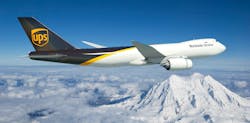Boeing Reports Disappointing Earnings, End of 747 Production
Boeing Co. continued to sustain heavy pressure from reduced demand due to the coronavirus pandemic as well as the sustained grounding of its 737 MAX jet. In its second-quarter earnings, the aviation company reported quarterly revenue of $11.8 billion, down $5,101 billion from the first quarter of 2020, and down 25% compared to Q2 2019.
Boeing’s commercial airlines division reported 20 million in revenue during the second quarter—78% lower than the 90 million it reported in the second quarter of 2019, and a further drop from Q1 2020’s revenue of 50 million. Boeing said the decrease reflected a lower delivery volume, and that its operating margin (169.1% this last quarter) was negatively impacted by $712 million in extra costs related to the troubled 737 MAX jet.
In an announcement accompanying the earnings report, Boeing CEO Dave Calhoun said the pandemic impact on his company was “still severe” and gave details on measures taken to reduce the impact of the novel coronavirus outbreak. In order to help cope with the sliding numbers in revenue and demand, he announced it would reduce production rates of its commercial airlines, which delivered 20 airplanes over the course of the quarter.
Production of the troubled 737 MAX resumed during the quarter, but the next planned deliveries of the planes were pushed back from September to sometime before the end of the year. Calhoun also confirmed that production of the company’s 747 jet would end in 2022, although support for the hump-backed plane would continue.
Despite having already committed to reducing Boeing’s net workforce by 10%, Calhoun said that the prolonged impact of the virus meant the company was considering further cuts. “Regretfully, the prolonged impact of COVID-19 causing further reductions in our production rates and lower demand for commercial services means we’ll have to further assess the size of our workforce,” he wrote. Earlier in the year, Boeing instituted a program of voluntary layoffs to reduce costs before resorting to involuntary layoffs.
“The reality is the pandemic’s impact on the aviation sector continues to be severe,” wrote Calhoun. He predicted that it would take up to three years for airplane ridership to return to 2019 levels and said that airlines hurt by the virus were delaying jet purchases, slowing deliveries, retiring older aircraft and reducing spending, all of which hurt Boeing’s bottom line.
In Boeing’s other divisions, defense, space and security, the aerospace manufacturer reported about $6.588 billion in revenues for the quarter. The figure was little changed from last year: in Q2 2019, Boeing recorded $6.579 billion from its defense and space projects.
About the Author
Ryan Secard
Associate Editor
Ryan Secard joined Endeavor B2B in 2020 as a news editor for IndustryWeek. He currently contributes to IW, American Machinist, Foundry Management & Technology, and Plant Services on breaking manufacturing news, new products, plant openings and closures, and labor issues in manufacturing.
